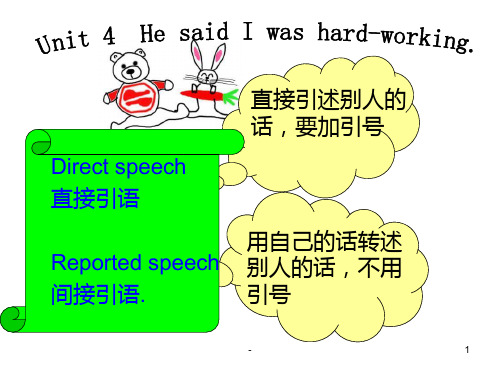直接引语变间接引语精华版PPT课件
合集下载
高中英语直接引语变间接引语(35张PPT)

➢句子结构的变化
1. 直接引语是陈述句,变为间接引语的方法 引导词为: that 语序: 不变
• He said, “I have been to the Great Wall. ” • He said that he had been to the Great Wall. • He said, “I'll give you an exam next Monday. ”
Direct Speech & Indirect speech
直接引语: 妈妈说:” 杰克是个好工人“. Direct speech:
Mother said :”Jack is a good worker.” 间接引语:妈妈说杰克是个好工人。 Indirect speech: Mother said that Jack is a good worker
小结:
➢ 在直接引语变为间接引语时需要注意的变化 1.注意时态的变化; 2.注意人称变化; 3.注意指示代词的变化; 4.注意时间状语的变化; 5.注意地点状语的变化; 6.注意个别趋向动词的变化。
将下列句子转换为间接引语:
1. He said,“ I have finished my homework last night”. He said that he had finished his homework the night before.
⑤直接引语如果是以“Let's”开头的祈使句,变为间 接引语时,通常用“suggest +动名词(或从句)” 如: He said, "Let's go to the movies."
→He suggested going to the movies. 或He suggested that they go to see the movies.
直接引语和间接引语(19张PPT)初中英语专项复习课件

直接引语变间接引语
一、直接引语&间接引语 – 定义 二、句子结构变化规则 三、语序变化规则 四、人称变化规则 五、时态变化规则 六、指代状动变化规则
一、直接引语 间接引语 -- 定义
直接引语:引用别人的原话; Peter said “ Jack is a Bully!” 间接引语:用自己的话转述别人的话(宾语从句) Peter said that Jack was a Bully.
She said, “ I broke your phone.” She said that she _h_a_d_b_r_o_k_e_n my phone.
现在完成时→ 过去完成时
She said, “ He has gone home.” She said that he __h_a_d_g_o_n_e__ home.
go take have to
六、指代状动变化规则
5变: 指代状动
指示代词 时间状语 地点状语
this→that; these→those
now→then; today→that day; yesterday→the day before last week→the week before; tomorrow→the next day
一般现在时→ 一般过去时
He said, “ I know it.” He said that hek_n_e_w it.
现在进行时→ 过去进行时
He said, “ I am drinking milk.” He said that he _w_a_s_d_r_in_k_i_ng_ milk.
一般过去时→过去完成时
• 4.The teacher said, “The sun is bigger than the moon.”
一、直接引语&间接引语 – 定义 二、句子结构变化规则 三、语序变化规则 四、人称变化规则 五、时态变化规则 六、指代状动变化规则
一、直接引语 间接引语 -- 定义
直接引语:引用别人的原话; Peter said “ Jack is a Bully!” 间接引语:用自己的话转述别人的话(宾语从句) Peter said that Jack was a Bully.
She said, “ I broke your phone.” She said that she _h_a_d_b_r_o_k_e_n my phone.
现在完成时→ 过去完成时
She said, “ He has gone home.” She said that he __h_a_d_g_o_n_e__ home.
go take have to
六、指代状动变化规则
5变: 指代状动
指示代词 时间状语 地点状语
this→that; these→those
now→then; today→that day; yesterday→the day before last week→the week before; tomorrow→the next day
一般现在时→ 一般过去时
He said, “ I know it.” He said that hek_n_e_w it.
现在进行时→ 过去进行时
He said, “ I am drinking milk.” He said that he _w_a_s_d_r_in_k_i_ng_ milk.
一般过去时→过去完成时
• 4.The teacher said, “The sun is bigger than the moon.”
直接引语变间接引语(完整)PPT课件

CHENLI
17
二、间接叙述转换为直接叙述
(1)改标点,改逗号为冒号,添加引号。 (2)改人称如果转述内容中是第三人称“他 (她)”或“他(她)们”,应改为“我”或 我(们)”;如果在转换时遇到一个句子中有两个 第一人称“我”时,应改后面的一个“我”为第二 人称“你”。
CHENLI
18
例:姐姐说,她明天送给我一件生日礼物。 改为:姐姐说:“我明天送给你一件生日礼物。
9、老师对王小宁说:“我有事,你组 织同学们继续完成制作。”
10、王明再也忍不住了,抢着对老班长 说:“我帮你一起找,我找得见。”
CHENLI
16
8、老师严厉地对小敏说,他必须把教室打扫干净。
9、老师对王小宁说,他有事,王小宁组织同学们继续 完成制作。
10、李明再也忍不住了,抢着对老班长说,他我帮老班 长一起找,他找得见。
CHENLI
19
1、妈妈问小宁他昨天去了哪里,她找了 他一整天。
妈妈问小宁:“你昨天去了哪里?我找 了你一整天。”
2、小方说,不行,他的字写得不够好, 应该让小宇去参加比赛。
小方说:“不行,我的字写得不够好,
应该让小宇去参加比赛。”CHENLI
20
3、王兰告诉我,我作文比赛得了一等奖。
4、王刚对李明说,他的鞋破了,脚掌也 出血了,他实在走不动,让李明自己先 走吧!
CHENLI
21
3、王兰告诉我,我作文比赛得了一等奖。
王兰告诉我:“你作文比赛得了一等奖。”
4、王刚对李明说,他的鞋破了,脚掌也 出血了,他实在走不动,让李明自己先 走吧!
王刚对李明说:“我的鞋破了,脚掌也
出血了,我实在走不动,你自己先走吧!”
CHENLI
直接引语变间接引语精华版PPT课件

He said, “I want to go swimming now. ”
→ He said he wanted to go swimming then.
地点状语,尤其表示方向性的,
here 变 there
The teacher said ,“ You should come here at 7:00.”
现在进行时
过去进行时
He said, “I'm eating an apple.” → He said that he was eating an apple.
一般将来时
过去将来时
Tom said to me “I’ll go to Shanghai next week” Tom told me that he would go to Shanghai
直接引述别人的 话,要加引号
Direct speech 直接引语
用自己的话转述
Reported speech 别人的话,不用
间接引语.
引号
-
1
直接引语变间接引语,即变为宾语从句主要需要 注意以下五点: 1.宾语从句必须用陈述语序。 2.主句时态决定从句时态:如果主句为一般现在时, 从句可以用任何时态(原题给的啥时态就用啥时态); 如果主句为一般过去式,从句必须要用所给时态的 对应的过去式。 3.引导词。 4.人称的转换。 5.时间状语的转换。
C. whether he'll come D. if he comes 2. Could you tell me ___D______ the nearest hospital is?
A. what B. how C. whether D. where
3. Tom asked my friend ____D____.
直接引语与间接引语PPT(最全)

yesterday morning /afternoon/evening two days ago /weeks/months/years the day before yesterday the day after tomorrow last night /week/month/year next week /month/year tomorrow
• ②选择疑问句 • 须用whether…or • I asked Sally,“Will you stay with me or go by yourself on a picnic?” • → I asked Sally whether she would stay with me or go by herself on a picnic.
Practice
• She said. "My brother wants to go with me." • He said to Kate. "How is your sister now?" • Mr. Smith said: "Jack is a good worker。"
三.时态的变化 1. 时态变化的情况
• 3. 直接引语为祈使句 • ① 将祈使句的谓语动词变成不定式,作宾 语补足语 • tell/ask/order/beg/request sb. (not) to do sth. • “Don’t touch anything,”he said. • → He told us not to touch anything. • ② 表示建议的祈使句,需改成 “suggest/advise that …(should)….”结构 • “Try again and see what will happen,”the teacher said. • → The teacher advised/suggested that they (should) try again and see what will happen.
• ②选择疑问句 • 须用whether…or • I asked Sally,“Will you stay with me or go by yourself on a picnic?” • → I asked Sally whether she would stay with me or go by herself on a picnic.
Practice
• She said. "My brother wants to go with me." • He said to Kate. "How is your sister now?" • Mr. Smith said: "Jack is a good worker。"
三.时态的变化 1. 时态变化的情况
• 3. 直接引语为祈使句 • ① 将祈使句的谓语动词变成不定式,作宾 语补足语 • tell/ask/order/beg/request sb. (not) to do sth. • “Don’t touch anything,”he said. • → He told us not to touch anything. • ② 表示建议的祈使句,需改成 “suggest/advise that …(should)….”结构 • “Try again and see what will happen,”the teacher said. • → The teacher advised/suggested that they (should) try again and see what will happen.
高一英语直接引语与间接引语知识精讲PPT课件.ppt

❖ (二)转换方法: ❖ A. 直接引语是陈述句时,改成间接引语要作人称、
时态、时间状语、地点状语、指示代词、动词、呼 语等方面的变化。 ❖ 1. 人称的变化,包括人称代词、物主代词、反身代 词等。
❖ He said , “ I’ve left my book in your room . ” ❖ 他说:“我把我的书落在了你的房间。”
❖ (1)They said , “ we are having an exam now . ” 他们说, “我们正在考试。”
❖ They said that they were having an exam then . 他们说 那时他们正在考试。
❖ (2)John told me , “ About 5,000 people went to the concert yesterday . ”
❖ ▲ 没有间接宾语的,可以加一个间接宾语。 如me,him等。
❖▲ 从句用陈述语序。 ❖eg .(1)He said , “ Do you
understand ? ” ❖他问,“你理解吗?”
❖ He asked me if / whether I understood .
❖他问我是否我理解了。
❖ (2)He asked me , “ Which part of China impresses you most ? ”
❖ (3)tonight→that night (4)this week→that week
❖ (5)yesterday→the day before (6)yesterday evening→the evening before
❖ (7)last week→the week before (8)three days ago→three days before
时态、时间状语、地点状语、指示代词、动词、呼 语等方面的变化。 ❖ 1. 人称的变化,包括人称代词、物主代词、反身代 词等。
❖ He said , “ I’ve left my book in your room . ” ❖ 他说:“我把我的书落在了你的房间。”
❖ (1)They said , “ we are having an exam now . ” 他们说, “我们正在考试。”
❖ They said that they were having an exam then . 他们说 那时他们正在考试。
❖ (2)John told me , “ About 5,000 people went to the concert yesterday . ”
❖ ▲ 没有间接宾语的,可以加一个间接宾语。 如me,him等。
❖▲ 从句用陈述语序。 ❖eg .(1)He said , “ Do you
understand ? ” ❖他问,“你理解吗?”
❖ He asked me if / whether I understood .
❖他问我是否我理解了。
❖ (2)He asked me , “ Which part of China impresses you most ? ”
❖ (3)tonight→that night (4)this week→that week
❖ (5)yesterday→the day before (6)yesterday evening→the evening before
❖ (7)last week→the week before (8)three days ago→three days before
直接引语转间接引语ppt课件

→ The boy told us that he usually gets up at six every
morning.
1.The interviewer asked Detective Lu , ‘Why did you become a detective last year?’ The interviewer asked Detective Lu why he had become a detective the year before.
2.‘Where did you go two days ago?’ Lily asked Lucy. Lily asked Lucy where she had been two days before.
3.‘Will you go to see a film with me tomorrow?’ Sam asked Dick. Sam asked Dick whether/if he would go to see a film with him the following day/the next day.
直接引语转间接引语
1、时态变化:
2、人称变化:一主、二宾、三不变
3、时间状语和地点状语变化 4、指示代词、情态动词 5、 句子类化:
一般现在时 现在进行时 一般将来时
一般过去时 过去进行时 过去将来时
现在完成时
过去完成时
一般过去时
过去完成时
10.‘Light travels faster than sound.’ said the teacher. The teacher said that light travels faster than sound.
1. She said to Tom, ‘Can you help me?’ 2. She asked, ‘Is this book yours or his?’ 3. The teacher asked, ‘how did you repair it?’ 4. The teacher said to the students, ‘Don’t waste your time.’ 5. The mother said, ‘Tom, get up early, please.’ 6. ‘Will you go to the concert with me this evening?’ Mary asked me. 7. ‘What did you do yesterday?’ the old man asked my brother. 8. The engineer said, ‘I was at college in 1967.’ 9. ‘Where does your chemistry teacher live, Karen?’ the young man asked. 10. ‘Why were you late yesterday morning?’ His teacher asked.
morning.
1.The interviewer asked Detective Lu , ‘Why did you become a detective last year?’ The interviewer asked Detective Lu why he had become a detective the year before.
2.‘Where did you go two days ago?’ Lily asked Lucy. Lily asked Lucy where she had been two days before.
3.‘Will you go to see a film with me tomorrow?’ Sam asked Dick. Sam asked Dick whether/if he would go to see a film with him the following day/the next day.
直接引语转间接引语
1、时态变化:
2、人称变化:一主、二宾、三不变
3、时间状语和地点状语变化 4、指示代词、情态动词 5、 句子类化:
一般现在时 现在进行时 一般将来时
一般过去时 过去进行时 过去将来时
现在完成时
过去完成时
一般过去时
过去完成时
10.‘Light travels faster than sound.’ said the teacher. The teacher said that light travels faster than sound.
1. She said to Tom, ‘Can you help me?’ 2. She asked, ‘Is this book yours or his?’ 3. The teacher asked, ‘how did you repair it?’ 4. The teacher said to the students, ‘Don’t waste your time.’ 5. The mother said, ‘Tom, get up early, please.’ 6. ‘Will you go to the concert with me this evening?’ Mary asked me. 7. ‘What did you do yesterday?’ the old man asked my brother. 8. The engineer said, ‘I was at college in 1967.’ 9. ‘Where does your chemistry teacher live, Karen?’ the young man asked. 10. ‘Why were you late yesterday morning?’ His teacher asked.
高中英语直接引语变间接引语(共31张PPT)

Direct speech & reported speech
Definition(定义)
• 原封不动地引用原话,把原 话放在引号内,叫直接引语 (Direct speech)
• 用自己的话加以转述,叫间 接引语(Indirect/reported speech),此时没有引号
I understand you.
She said that she would go shopping the next day.
• 规律: 当主句动词为现在时,间接引语中的动词时态保持不 变; 当主句动词为过去时,间接引语中的动词作相应的前 推
一般现在时 现在完成时 现在进行时 一般将来时 一般过去时
一般过去时 过去完成时 过去进行时 过去将来时 过去完成时
could, would, might, used to, had better等, 时态不再变。
She said to me, “You must hurry up.” → She told me I must hurry up.
5. 从句为过去完成时态、过去进行时态时
不变
Practice
1. “I’ve found my wallet,” he said to me. He _t_o_ld___ me he _h__a_d__ _fo_u_n_d__ __h_is___
homework that night.
“ I will go to college.”
What does he often
? say
He often says he will go to college.
“I am playing football.”
? What did he say
Definition(定义)
• 原封不动地引用原话,把原 话放在引号内,叫直接引语 (Direct speech)
• 用自己的话加以转述,叫间 接引语(Indirect/reported speech),此时没有引号
I understand you.
She said that she would go shopping the next day.
• 规律: 当主句动词为现在时,间接引语中的动词时态保持不 变; 当主句动词为过去时,间接引语中的动词作相应的前 推
一般现在时 现在完成时 现在进行时 一般将来时 一般过去时
一般过去时 过去完成时 过去进行时 过去将来时 过去完成时
could, would, might, used to, had better等, 时态不再变。
She said to me, “You must hurry up.” → She told me I must hurry up.
5. 从句为过去完成时态、过去进行时态时
不变
Practice
1. “I’ve found my wallet,” he said to me. He _t_o_ld___ me he _h__a_d__ _fo_u_n_d__ __h_is___
homework that night.
“ I will go to college.”
What does he often
? say
He often says he will go to college.
“I am playing football.”
? What did he say
直接引语变为间接引语ppt课件

直接引语为一般疑问句时,间接引语中用 whether或if引导;直接引语为特殊问句时,间 接引语中仍用原来的疑问词。
从使用情况来看,闭胸式的使用比较 广泛。 敞开式 盾构之 中有挤 压式盾 构、全 部敞开 式盾构 ,但在 近些年 的城市 地下工 程施工 中已很 少使用 ,在此 不再说 明。
For example:
For example: 1. "Open the door,please."She said.
She asked me to open the door.
2. It says,"No smoking here." It told us not to smoke there.
从使用情况来看,闭胸式的使用比较 广泛。 敞开式 盾构之 中有挤 压式盾 构、全 部敞开 式盾构 ,但在 近些年 的城市 地下工 程施工 中已很 少使用 ,在此 不再说 明。
时态的变化
当主句是过去时时,从句要得变为相应的过去时态, 变化规律如下:
一般现在时—— 一般过去时 一般过去时—— 过去完成时 一般将来时—— 过去将来时 现在进行时—— 过去进行时 现在完成时—— 过去完成时 过去完成时—— 过去完成时(时态不变) 过去进行时—— 过去进行时(时态不变)
从使用情ቤተ መጻሕፍቲ ባይዱ来看,闭胸式的使用比较 广泛。 敞开式 盾构之 中有挤 压式盾 构、全 部敞开 式盾构 ,但在 近些年 的城市 地下工 程施工 中已很 少使用 ,在此 不再说 明。
English teacher. 另外注意直接引语为复数,引述者主语为单数,间接引语主语相应变复
数。如: He said,“Are you interested in English?”→He asked me/us if I
从使用情况来看,闭胸式的使用比较 广泛。 敞开式 盾构之 中有挤 压式盾 构、全 部敞开 式盾构 ,但在 近些年 的城市 地下工 程施工 中已很 少使用 ,在此 不再说 明。
For example:
For example: 1. "Open the door,please."She said.
She asked me to open the door.
2. It says,"No smoking here." It told us not to smoke there.
从使用情况来看,闭胸式的使用比较 广泛。 敞开式 盾构之 中有挤 压式盾 构、全 部敞开 式盾构 ,但在 近些年 的城市 地下工 程施工 中已很 少使用 ,在此 不再说 明。
时态的变化
当主句是过去时时,从句要得变为相应的过去时态, 变化规律如下:
一般现在时—— 一般过去时 一般过去时—— 过去完成时 一般将来时—— 过去将来时 现在进行时—— 过去进行时 现在完成时—— 过去完成时 过去完成时—— 过去完成时(时态不变) 过去进行时—— 过去进行时(时态不变)
从使用情ቤተ መጻሕፍቲ ባይዱ来看,闭胸式的使用比较 广泛。 敞开式 盾构之 中有挤 压式盾 构、全 部敞开 式盾构 ,但在 近些年 的城市 地下工 程施工 中已很 少使用 ,在此 不再说 明。
English teacher. 另外注意直接引语为复数,引述者主语为单数,间接引语主语相应变复
数。如: He said,“Are you interested in English?”→He asked me/us if I
直接引语变间接引语讲解ppt

She asked me
Whether / if I was ready.
4. 直接引语是祈使句变为间接引语的方法 间接引语应改为 “tell (ask, order等) sb (not) to do sth.”句型。 She said, “ Don’t talk.” She asked the children not to talk.
2.特殊疑问句直接引语变间接引语 When do you have math? ( They asked him )
陈述句语序(即主语在前,谓语在后)
you have math
They asked him when
you have math. he had
They asked him when he had math.
Are you a teacher? ( They asked him )
you are a teacher
They asked him Whether/if you are a teacher.
he was They asked him whether he was a teacher.
“Are you ready?”
• • • • • • • • • • • • • • • here • over here • tonight • now • today • yesterday • tomorrow • last week/month/year… • next week/month/year…• …ago • the day after tomorrow • this • these • come • bring • there over there that night then that day the day before the next day the week/moth/year…before… the next week/month/year… …before two days later that those go take
- 1、下载文档前请自行甄别文档内容的完整性,平台不提供额外的编辑、内容补充、找答案等附加服务。
- 2、"仅部分预览"的文档,不可在线预览部分如存在完整性等问题,可反馈申请退款(可完整预览的文档不适用该条件!)。
- 3、如文档侵犯您的权益,请联系客服反馈,我们会尽快为您处理(人工客服工作时间:9:00-18:30)。
-
4
2)特殊疑问句。仍用原来的疑问词引导。
Eg.“Where are you going?” the father asked his son.
The father asked his son where he was going.
Eg.The policeman asked the small boy, “Where do you live?”
now
then today
those that day
yesterday
the day before
tomorrow
the next day
this week
that week
next week(month,year) the next week(month, year
here
there
come
go
d to him.
His father told him that he should be more careful
the next time.
2.Mr.Wang said,“I will leave for Shanghai on business
next month.”
Mr. Wang said that he would leave for Shanghai
直接引述别人的 话,要加引号
Direct speech 直接引语
用自己的话转述
Reported speech 别人的话,不用
间接引语.
引号
-
1
直接引语变间接引语,即变为宾语从句主要需要 注意以下五点: 1.宾语从句必须用陈述语序。 2.主句时态决定从句时态:如果主句为一般现在时, 从句可以用任何时态(原题给的啥时态就用啥时态); 如果主句为一般过去式,从句必须要用所给时态的 对应的过去式。 3.引导词。 4.人称的转换。 5.时间状语的转换。
-
7
如果主句是一般现在时,直接引语变间接引语时,
从句的时态不变。
He says, “I’m not good math. ”
练
He says that he’s not good at math.
习
1.“You should be more careful next time,” his father sai
He said, “I want to go swimming now. ”
→ He said he wanted to go swimming then.
地点状语,尤其表示方向性的,
here 变 there
The teacher said ,“ You should come here at 7:00.”
the next week.
-
3
2. 直接引语如果是疑问句,变为间接引语时,要 把疑问句语序改为陈述句语序。 1)一般疑问句。用whether或if引导。主句中的 动词是said时改为asked,没有间接宾语的,可 以加一个间接宾语。 Eg. He said, “Are you a student?”
→The teacher said I should go there at 7:00.
指示代词修饰的状语,由“此”改为“彼”
例:this 改为that
He said, "This books is mine.“
→He said that book was his.
-
6
this
that these
on business the next month.
3.She said to him, “It’s time that you left here.”
She told him that it was time that he left there.
-
8
注:
(1)如果在当天转述today,yesterday, tomorrow 等
现在进行时
过去进行时
He said, “I'm eating an apple.” → He said that he was eating an apple.
一般将来时
过去将来时
Tom said to me “I’ll go to Shanghai next week” Tom told me that he would go to Shanghai
The teacher told us to write our names on
our papers first. -
5
直接引语变间接引语,状语变化有其内在规律,
时间状语由“现在”改为“原来”。
(例:now变为then, yesterday变为 the day before,
today变为 that day
-
2
1. 陈述句 直接引语如果是陈述句,变为间接引语
时,用连词that引导(that在口语中常省略)
一般现在时
一般过去时
He said, “I‘m afraid I can’t finish this work.”
→ He said that he was afraid he couldn‘t
finish that work.
The policeman asked the small boy where he lived.
3. 祈使句。句型:tell/ask/order sb (not)to do sth Eg.“Write your names on your papers first,” the
teacher said to us.
He asked me whether I was a student. Eg.
“Are you sorry for what you have done?”the
mother asked the boy. The mother asked the boy if he was sorry
for what he had done.
时间状语也不必改变。
(2)如果在当地转述,here 不必改为there,动词
come 不必改为go.
(3)当转述客观真理时,直接引语变为间接引语
时,时态不变。如:
He said, "Light travels much faster than sound."
He said that light travels much faster than sound.
